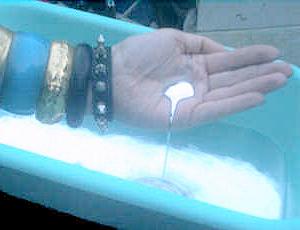 美國總統布希14日晚上簽署立法一項由參議員歐巴馬(Barack Obama)提出的法案:禁止美國輸出汞元素;此一法案的通過將有助於保護美國人民和全球人口免於汞中毒。
美國總統布希14日晚上簽署立法一項由參議員歐巴馬(Barack Obama)提出的法案:禁止美國輸出汞元素;此一法案的通過將有助於保護美國人民和全球人口免於汞中毒。
同為民主黨總統候選人的歐巴馬表示,「對於每天都處在充滿汞的負面影響中的數百萬脆弱人民,布希總統通過這項兩黨共提的法案對他們而言可說是具重大意義的勝利。」
「兒童受到汞暴露汙染會導致嚴重的發育問題,此外視力、肢體動作能力及血壓會受到波及,且還會影響成年後的生殖能力」,歐巴馬說道,「儘管過去幾年來,我們盡力控制並收集汞,但我國仍是這個危險產品的全球第一大輸出國,因此對於此法案將終結汞輸出,我深感驕傲。」
「2008年禁止汞輸出法案」明文禁止聯邦政府機構移送元素汞、2013年之前限制美國出口元素汞,並要求能源部門指定和管理一個長期存放元素汞的處置場。
禁止汞輸出法案獲得眾多團體的支持,從環保人士到美國化學協會(American Chemistry Council)都相當關切。「對於公共健康,我們如今已贏得一個重要的勝利,拯救了無數本地或是外地人的生命」,一位自然資源保護委員會(Natural Resources Defense Council)科學家基音(Susan Keane)表示,「禁止汞出口將能永續降低魚類受到汞污染的程度、防止汙染水資源,以及避免孩童接觸到危險的化學物質等。」 「這項兩黨共提的法案通過,意味著他們克服了困難重重的政治因素,以讓全球數百萬人口都能受惠」,基音說道,「這是個驚人的成就,我讚揚他們所付出的一切努力。」
美國化學協會主席兼執行長杜利(Cal Dooley )表示,「這項法案立法通過的獨特之處,不單是因為民主黨和共和黨的共同支持,這同時也反映出眾多利害關係人聯合在一起時所能做到的努力。其中包括美國化學協會、自然資源保護委員會、各州環境協會、氯物質化學委員會,及美國礦物協會等順利的合作好幾個月,來幫助讓2013年1月1日之前禁止美國出口元素汞的法案通過立法。」
「《禁止汞輸出法案》終止了有毒物質的惡性循環,」基音進一步解釋道,「當這種危險的神經性毒物逐步從美國產業及政府機構中排除後,剩下來的汞就被送往海外的開發中國家,而那些汞都是高度污染產業所排放的。然而,那些不容許留在美國的汞,不僅讓進口國家的空氣和水資源受到汞汙染,且汞也有可能漂流數千哩,最後仍回到美國本土,而讓美國人引發汞中毒的最主要原因是食用受到汞污染的魚類。」
該法案由布希總統簽署立法,參、眾兩院也壓倒性通的通過法案,因此現在根據美國法律規定,還留在美國的汞就必須留在美國境內。
A bill introduced by Senator Barack Obama that will help protect Americans and people around the world from mercury poisoning by banning the export of elemental mercury from the United States, was signed into law last night by President George W. Bush.
Senator Obama, the Democratic presidential candidate, said, "The president's approval of this bipartisan bill is an important victory for millions of the world's most vulnerable citizens who are exposed to the harmful effects of mercury every day."
"Exposure to mercury leads to serious developmental problems in children as well as problems affecting vision, motor skills, blood pressure, and fertility in adults," said Obama. "Despite our country's improved efforts to contain and collect mercury over the years, we remain one of the world's leading exporters of this dangerous product, so I am proud this bill will finally ban mercury exports."
S. 906, the Mercury Export Ban Act of 2008, prohibits the transfer of elemental mercury by federal agencies, bans U.S. export of elemental mercury by 2013, and requires the Department of Energy to designate and manage an elemental mercury long-term disposal facility.
The Mercury Export Ban Act won support from a wide spectrum of interests, from environmentalists to the American Chemistry Council.
"Today we have won a momentous victory for public health that will save lives both here and abroad," said Susan Keane, a scientist for the Natural Resources Defense Council. "Banning the export of mercury will substantially reduce mercury contamination in fish, prevent the contamination of our water, and shield our children from a dangerous chemical."
"Those involved overcame a difficult political climate to enact bipartisan legislation that will benefit millions of people around the globe," said Keane. "This is no small feat, and I commend them for their hard work."
American Chemistry Council President and CEO Cal Dooley said, "What makes this legislation unique is that it not only reflects support of both Democrats and Republicans, it also reflects what is possible when a broad-based coalition of stakeholder interests comes together. The American Chemistry Council, the Natural Resources Defense Council, the Environmental Council of the States, the Chlorine Institute, Inc., and the National Mining Association successfully worked together for many months to help enact this legislation to ban exports of elemental mercury from the United States by January 1, 2013."
The Mercury Export Ban Act puts an end to a vicious cycle of poison, Keane explained. While this dangerous neurotoxin is being phased out by industry and the government here in the United States, surplus mercury is shipped overseas to developing countries, where it is released from highly polluting industries, she said.
"Not only is the air and water in those importing countries contaminated with concentrations of mercury that would not be tolerated in the United States, the mercury can also travel for thousands of miles and can settle right back here in the United States, poisoning Americans mainly through consumption of contaminated fish," Keane said.
The law, signed by President Bush and passed by the House and Senate with overwhelming majorities, now requires that all mercury in the United States remain here, where it can be managed according to U.S. laws.






